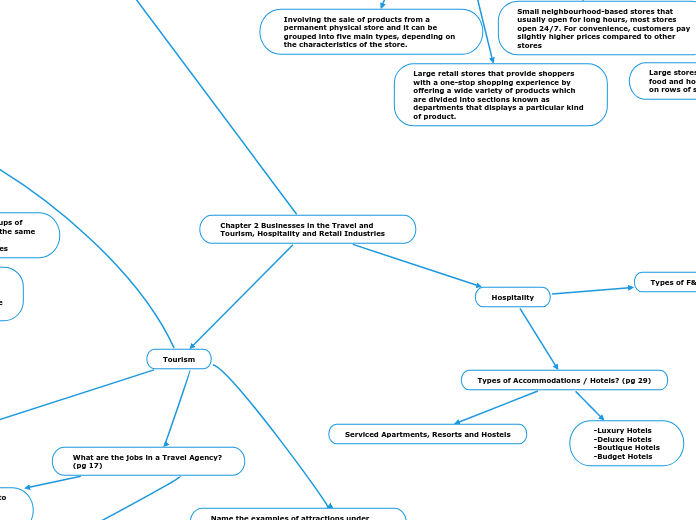Chapter 2 Businesses in the Travel and Tourism, Hospitality and Retail Industries
Tourism
What is Travel Agency? What do they sell? (pg 16)
They sell products like holiday packages, tickets for flights, travel insurance, Visa application and Travel incentives
Travel agencies are businesses that sell travel products directly to travellers.
What are the jobs in a Travel Agency?
(pg 17)
Tourist guides, lead individuals or groups on short trips, sightseeing tours and visits to attractions
Tour agents, are hired by travel agencies to sell products to customers. They also help customers find suitable products for the customer's holiday packages
Name the examples of attractions under each category.
Nature and Wildlife Attractions? (pg 19)
Parks and nature reserves
-Bukit Timah Nature Reserve
-East coast park
-Singapore Botanic Gardens
-Sungei Buloh Wetland Reserve
Nature reserves and green spaces for outdoor enthusiasts and nature lovers and attractions such as zoos and aquariums caters to visitors who are interested to learn more about animals and their habitats
Zoos and aquariums
-Night Safari
-River Safari
-Singapore Zoo
-Jurong Bird Park
Historical and Cultural Attractions? (pg 20)
Museums and Historical sites
-National Museum of Singapore
-National Gallery Singapore
-Singapore Art Gallery
-Reflections at Bukit Chandu
Attractions that help visitors to understand the history, culture and traditions of singapore. It holds exhibitions and display artefacts relating to history and heritage of singapore.
Ethic quarters
-Chinatown
-Joo Chiat
-Kampong Glam
-Little India
Commercial Attractions? (pg 21)
Shopping districts
Theme parks
-Wild Wild Wet
-Universal Studios
Integrated resorts
-Marina Bay Sands®
-Resorts World Sentosa™
Attractions that are places of interest which are developed to satisfy visitor's needs for different leisure activities
Events? (pg 23)
Sporting Events
-OCBC cycle
-Standard Chartered Singapore Marathon
Festivals
-Christmas
-Deepavali
-Lunar New Year
-Singapore Food Festival
The Perfoming Arts
Events that large number of visitors come to singapore to participate with activities hosted during the events
What is MICE? (pg 25)
Meetings involve groups of people gathering for the same purpose. Eg: Training sessions for employees
Incentives are benefits that's given to employees by the company to reward them for their hard work. Eg: All expense paid holiday packages
Conventions are gathering of large groups of people to exchange ideas, views and knowledge on issues that are concerning.
-Meetings
-Incentives
-Conventions
-Exhibitions
Hospitality
Types of Accommodations / Hotels? (pg 29)
Serviced Apartments, Resorts and Hostels
-Luxury Hotels
-Deluxe Hotels
-Boutique Hotels
-Budget Hotels
Types of F&B? (pg 33)
Food Courts and Hawker Centres
Food courts and Hawker centres are popular places to get a meal in Singapore. The food can be bought at stall and eaten at a large, open space with tables, chairs and stools
Family Restaurants
Restaurants that provides kids menu or meal. They may also have activity sheets or play areas for children
catering Services
Caterers provide food and beverages for special occasions such as parties and business events for a large number of guests
Fine Dining Restaurants
The interior decorations, settings and furnishings are grand, elegant and stylish. They are often expensive for less amount of food
Buffet Restaurants
Buffets offer a wide variety of food that are set at a fixed price.
Theme restaurants
Restaurants that are based on a common theme or idea
Coffee Houses
Coffee houses specialise in serving coffee and tea with simple food like cakes, pastries and sandwiches
Ethnic Restaurants
The decorations, setting and food served are based on an ethnicity
Retailing
Types of Store Retailing? Describe them.
Hypermarkets (pg 45)
Small neighbourhood-based stores that usually open for long hours, most stores open 24/7. For convenience, customers pay slightly higher prices compared to other stores
Supermarkets (pg 44)
Large stores that offer a wide selection of food and household items that are arranged on rows of shelves according to sections.
Convenience store (pg 44)
EXTREMELY large stores that combine features of a supermarket and a department store. It usually occupy EXTREMELY large store spaces and sell enormous range of products including a full range of groceries, household products, clothing and electrical appliances
Department stores (pg 43)
Large retail stores that provide shoppers with a one-stop shopping experience by offering a wide variety of products which are divided into sections known as departments that displays a particular kind of product.
Specialty stores (pg 42)
Involving the sale of products from a permanent physical store and it can be grouped into five main types, depending on the characteristics of the store.
Non-store retailing is the sale of goods and services outside the setting of a physical store.
Store retailing involves the sale of products from a permanent physical store and it can be grouped into five main types depending on the characteristics
Types of Non-Store Retailing? Describe them.
E-Retailing sells products over the internet and most e-retailers operate their businesses online without a physical store. Eg: RedMart and Carousell (pg 46)
Vending machines automatically dispense products after the customers make payment which can be done in cash or through credit cards or mobile payments. it can be set up easily and it provides a convenient alternative for customers. (pg 46)
Pushcarts refers to the sale of goods and services from small carts instead of stores. They are usually a variety of products including food and non-food items in an attractive manner. (pg 47)
Pop-Up retailing is a temporary physical setup in a unique environment used by retailers to create awareness of their products. The difference between pop-up retailing and regular retailing is that it is usually short-term. (pg 47)
